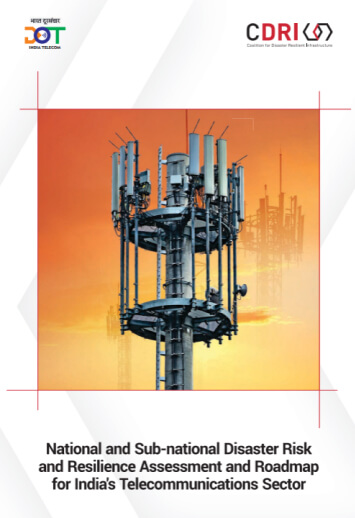CDRI Fellowship Programme Awardees 2025 – 26

CDRI Fellowship Programme 2025 – 26 financially supports 56 fellows from 12 countries working on 20 innovative projects to enhance disaster resilient infrastructure globally. These projects address climate change and diverse hazards such as earthquakes, floods, wildfires, and tsunamis through interdisciplinary approaches. Highlights include tsunami evacuation modelling in Japan-Peru, digital twin-based coastal resilience in India-Australia, […]
A Compendium of Good Practices on Disaster Resilient Infrastructure (DRI)

This compendium, compiled by CDRI and G20 partners, showcases 52 global case studies on disaster resilient infrastructure. It spans sector-specific interventions, post-disaster reconstruction, financing mechanisms, nature-based solutions, risk assessments, and governance frameworks. Highlights include India’s early warning systems, Nepal’s earthquake-resilient schools, Australia’s Betterment Fund, and Brazil’s water infrastructure projects. The document emphasizes inclusive, community-centered approaches, […]
Physical Climate Risk Assessment Playbook for the Financial Sector

The “Physical Climate Risk Assessment for the Financial Sector” playbook, developed by CDRI and supported by The Rockefeller Foundation, guides financial institutions (FIs) in low- and middle-income countries (LMICs) to assess and manage physical climate risks. It outlines a structured approach—awareness, assessment, and action—emphasizing the hazard-exposure-vulnerability (HEV) framework and climate value-at-risk (VaR) modelling. The playbook […]
Global Methodology for Infrastructure Resilience Review

The Global Methodology for Infrastructure Resilience Review provides a structured, five-step approach to help countries assess and enhance the resilience of their infrastructure systems. Developed by UNDRR and CDRI, it begins with mapping institutional governance and identifying key stakeholders across sectors. It then reviews existing policies and regulations to evaluate alignment with disaster risk reduction […]
National and Sub-national Disaster Risk and Resilience Assessment and Roadmap for India’s Telecommunications Sector

India’s telecom sector, contributing ~15% to global GDP, is projected to reach $2.8 trillion by 2030. With over 1.2 billion subscribers, it faces high vulnerability to disasters, 58% of the land is earthquake-prone, 12% flood-prone. The report, led by CDRI, introduces a multi-hazard risk assessment and the Disaster Risk and Resilience Assessment Framework (DRRAF). It […]
National and Sub-national Disaster Risk and Resilience Assessment and Roadmap for India’s Telecommunications Sector: A Policy Brief

India’s telecom infrastructure is increasingly vulnerable to natural hazards and disasters, with over 58% of the land exposed to earthquakes and other hazards. To address this, CDRI, in collaboration with the Department of Telecommunications, Government of India, and the National Disaster Management Authority, developed a Disaster Risk and Resilience Assessment Framework (DRRAF). The study mapped […]
Policy Brief: Developing power sector resilience to extreme weather events in coastal areas

This document outlines Odisha’s comprehensive approach to strengthening power sector resilience against cyclones and floods. Conducted by CDRI with the Government of Odisha, the study examines transmission and distribution vulnerabilities, revealing critical risks: 30% of substations are coastal, 75% of distribution lines exceed 30 years of age, and 80% of poles remain highly wind sensitive. […]
Five Steps towards Resilience of Airports

Airports are vital economic hubs but increasingly vulnerable to climate-related disasters. Enhancing resilience is critical with global airport investments projected to reach USD 2.4 trillion by 2040. The Global Study on Disaster Resilience of Airports by CDRI surveyed 111 airports across 54 countries, highlighting risks like rising sea levels and extreme weather. CDRI’s “Five Steps […]
Community of Practice for Extreme Heat Managementin Public Transport Systems

The guidance document focuses on extreme heat management in public transport systems, emphasizing resilience against rising temperatures. It examines the effects of extreme heat on infrastructure, public health, the environment, and the economy, reinforcing public transport’s role in equitable development. The document presents a framework for heat resilience, including baseline research, stakeholder planning, and integrated […]
